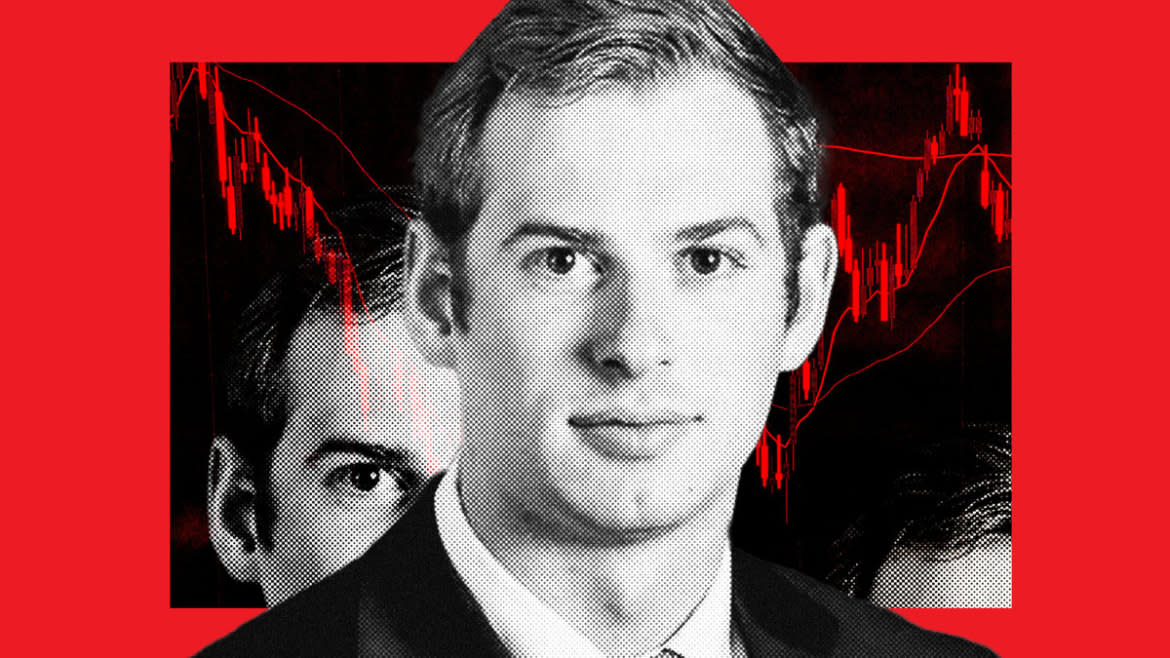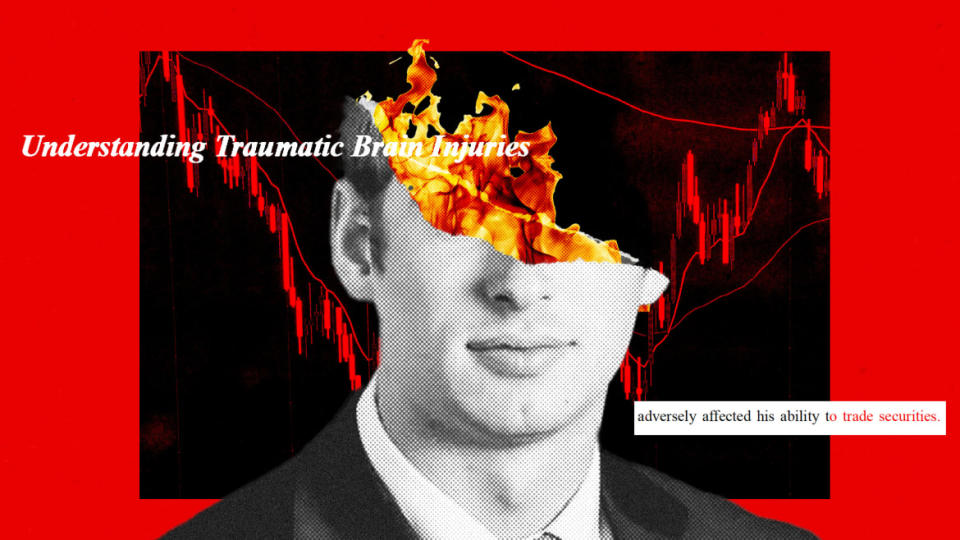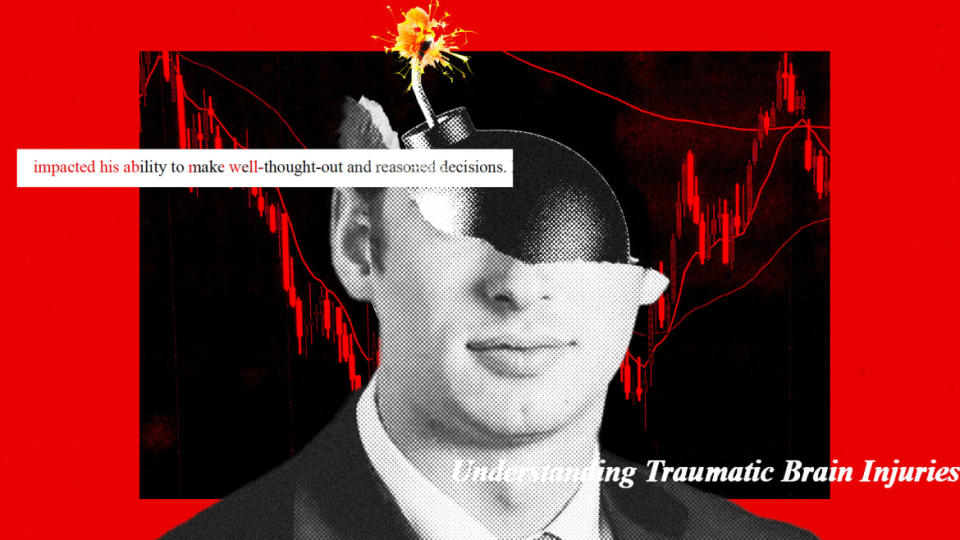How an Upper-Crust Trader’s Stock Disaster Spiraled Into Suicide

A cognitively impaired Connecticut man who died by suicide in 2021 after losing $700,000 trading stocks online never should have been allowed to make the highly risky investments, his family says.
William Tyler Allen’s traumatic brain injury made him “quite impulsive, which often led him to act without fully considering the consequences of his actions,” according to a lawsuit filed by Allen’s mom and obtained by The Daily Beast. But investing “requires a cool head, especially during market volatility,” it says, noting that Allen’s capacity for emotional regulation had been severely diminished by his injury.
The lawsuit, filed Sept. 29 in New York State Supreme Court, blames the online trading platforms Allen was using—Fidelity and Interactive Brokers—for his death, arguing the firms had a responsibility to stop him from taking risks inappropriate for someone with severe brain function issues. Allen, 27, was trading options on margin—that is, borrowing cash from his brokers to place bets on a stock’s future price. It’s a technique that can lead to an outsized bloodletting if the gamble goes sideways.
The situation is reminiscent of one involving another young investor who died by suicide in 2020 over a $730,000 loss he thought he had taken.
“If you’re reading this then I am dead,” 20-year-old Alexander Kearns wrote in a note he left behind. “…How was a 20-year-old with no income able to get assigned almost a million dollars in leverage?… A painful lesson. Fuck Robinhood.”
Under industry rules, brokers are required to make a suitability determination as to a client’s trading activity, according to the Allen family’s lawsuit. In his case, Fidelity and Interactive Brokers allowed him to open self-directed investment accounts and granted Allen “a substantial margin, thus enabling him to venture into perilous and speculative options and securities,” the lawsuit states, arguing that the firms never made an effort to determine whether Allen was competent or qualified to handle such trades.
“Instead, they were content to sit on their hands and collect their fees and commissions,” the suit goes on. “Eventually and devastatingly, economic suicide turned into an actual suicide.”
Attorney Adam Glassman, who filed the lawsuit on behalf of Allen’s family, told The Daily Beast that Allen—who went by his middle name—just “wanted to make good,” and for his parents to be proud of him. Their son’s death, Glassman said, has been almost too much for them to endure.
Tyler Allen had a knack for picking winners.
In 2010, as a high school sophomore, he and two other teens beat the S&P 500 in a stock market competition held by the Securities Industry and Financial Markets Association. Allen donated his share of the prize to his church.
The Mayflower descendant grew up in the wealthy enclave of Greenwich, Connecticut, and enjoyed bird hunting, fine wines, and far-flung travel destinations. The family summered in the Hamptons; Allen and his twin brother, Bradley, were both members of the Greenwich crew team. But Allen’s privileged life had a dark side. Bradley died of an opioid overdose after becoming addicted to painkillers following a car accident. And their private-equity fund manager father would later be found liable for defrauding investors of some $7 million.
In 2013, when he was 19, Allen was in a car wreck of his own. And although he survived the accident, he would never be the same, according to the lawsuit.
“Following TBI, many individuals, including Tyler, experience a shift in the intricate cognitive dance that governs how they think, act, and make choices,” it states.

It is as if the brain’s wiring has become undone, interrupting and distorting signals traveling across delicate pathways, according to the suit. The brain’s “braking system” can often become compromised, leading a person with a TBI to make abrupt decisions and engage in risky activities without regard for potential downsides, it says. Allen experienced all of this, and more: impaired processing speed, mental fatigue, difficulty concentrating for extended periods.
“Following Tyler’s TBI, he became quite impulsive, which often led him to act without fully considering the consequences of his actions,” the lawsuit states. “In the context of stock transactions, impulsivity led Tyler to make rash trading decisions based on fleeting emotions and surface-level information, rather than based on a comprehensive understanding of market dynamics.”
Still, Allen was able to live a relatively normal life—albeit slightly behind schedule. He graduated from Miami University in Oxford, Ohio, at the age of 26, with a bachelor’s degree in finance. He had a girlfriend, and was excited to move in with her, Glassman told The Daily Beast. Allen figured that if he put his money to work in the stock market, having already shown his prowess at achieving handsome returns as a teen, he and his other half could live comfortably.
But with his post-TBI emotional regulation issues, memory problems, and his brain’s now-attenuated processing speed, Allen was not equipped to handle the situation in which he soon found himself, the lawsuit states. Allen began trading options, which, as the lawsuit says, takes “strategies that require not just predicting stock movements but also understanding the nuances of option contracts.” Trading options on margin adds another layer of complexity, not to mention an incredible amount of risk, with the possibility of losing more than 100 percent of your investment.
Investing “often requires a cool head, especially during market volatility,” the lawsuit states. Allen, however, was prone to mood swings and “heightened emotional reactions,” it explains. Someone with a TBI like Allen’s “might make investment decisions driven by fear, anxiety, or euphoria rather than rational analysis,” the lawsuit says. Memory was also a hurdle for Allen, according to the suit.
At the same time, Allen was able to get himself licensed with FINRA, the industry regulator that governs registered brokers, and started his own firm. Allen gave himself the title of chief investment officer, and focused on “event-driven strategies,” according to his obituary, which said Allen used trading algorithms he developed himself.
Nevertheless, Allen’s brain injury made it impossible for him to “fully and properly grasp” the ins-and-outs of what he was doing, his parents’ lawsuit states. And, it argues, broker-dealers “have long had an affirmative duty to warn a customer about his or her own unsolicited activity, to prevent what has come to be known as ‘financial suicide.’”
“As a result of Tyler’s significant financial losses,” the lawsuit contends, “estimated at this time to be approximately $700,000.00, he became distraught and took his own life.”
Glassman declined to comment on the apparent discrepancy between Allen’s job title—self-assigned, to be sure—and the lawsuit’s description of extensive cognitive disabilities. What he did say was that Allen was planning to use the $700,000 to buy a house with his girlfriend, eventually get married, and “make a life for himself.”
“A 20-something-year-old, when he lost an enormous amount of money, that’s difficult for anyone to cope with, let alone a young man who’s barely had his frontal cortex close, and who can have the emotional maturity to withstand that,” Glassman told The Daily Beast. “So, is this really an unfortunate set of events that, when combined, really led to what I believe to be a tragic outcome.”
Fidelity and Interactive Brokers have not yet filed a formal response to the lawsuit. A Fidelity spokesperson told The Daily Beast on Friday, “As this is ongoing litigation, it is inappropriate for us to comment.” An Interactive Brokers spokesperson said, “The events surrounding this case are undeniably tragic, but IBKR was not responsible for Mr. Allen’s trading losses. Mr. Allen was an experienced investment professional who was registered with FINRA.”
Investment firms have ethical, legal, and regulatory obligations to all clients, but “especially those suffering with a TBI” making high-risk, self-directed trades, the lawsuit states.
“If a little old widow in tennis shoes walks into a brokerage firm and lays down $10,000 on the table and says she wants to risk it all on index options, can the brokerage firm accept this ‘unsolicited’ trade order without violating its suitability requirements?” the suit asks. “Can a firm knowingly let a client blow himself up, or can a firm knowingly let a client make unsuitable trades? Of course not.”
The suit points to online brokerage firms’ “constant bombardment” of commercials during popular events like the Super Bowl, which aim to convince regular people that they, too, can get rich without paying a professional to guide them. Allen, like many others, “eschewed the necessary professional advice of a broker under a mistaken belief based on e-broker advertisements that they don’t need one.” But, the suit argues, online brokerages still have the same duty to people making their own trades, to monitor customer accounts for unsuitable or inappropriate trades.

Contrary to Allen’s situation, Merrill Lynch flags any account that makes more than 250 trades or turns over more than five times in a year, the lawsuit says. Prudential’s rules bar clients from making trades representing more than 25 percent of their net worth, to buy more than 10,000 shares at a time, or to make more than 20 stock purchases in a day, it continues. Online brokerage firms are required by law to monitor customer accounts for signs of money laundering.
With a TBI, Allen was especially vulnerable, and Fidelity and Interactive Brokers owed him “numerous dues of care,” the lawsuit claims, running down a list of exactly how the two investment platforms allegedly contributed to Allen’s suicide. It says the “Know Your Customer,” or, KYC, protocols should include not only an understanding about that person’s risk tolerance and investment objectives, but also whether or not the customer’s outlook is influenced by any cognitive impairments such as a TBI.
The family is hoping the lawsuit will spur changes to the industry, and handle clients with TBIs in a particularly empathetic and diligent way. The “completely inappropriate” trading in Allen’s account should have set off alarms, the suit argues. But, it claims, no one at Fidelity or Interactive Brokers ever got to “know their customer” in Allen’s case, and simply allowed him to proceed down a path to financial ruin. The firms should have been aware of Allen’s TBI and, “upon their discovery, should have prompted a more cautious approach or even a decision to withhold the establishment of such accounts for him,” according to the suit.
“There is no reason why they cannot or should not monitor for suitability as well,” the lawsuit states.
It is not unheard of for an investor to sue over losses incurred by unsuitable margin trades. In 2021, Robinhood settled out of court with Alexander Kearns’ family over his market-related suicide. But, while tragic, legal experts aren’t convinced the family’s arguments will pass muster in court.
Attorney Carol Crossett, head of the Commercial Law Group in the New York City office of Tully Rinckey PLLC, believes Allen’s parents may be expecting too much from the brokerage firms they’re now suing.
The allegations go far beyond a firm’s duty to determine a client’s financial suitability, and impose an obligation to “conduct medical evaluations” to determine that client’s mental capacity—something brokers are not qualified to do, Crossett told The Daily Beast.
“How were the defendants even to have known about the TBI?” Crossett asked. “The forms that are filled in re: forms of disclosures do not ask [for] medical information because that is not within the scope of the defendants’ business.”
Further, Crossett pointed out, suicide is not usually caused by one singular event.
“Although I am sure this caused a great amount of stress, and I empathize, whether the son was suicidal before these events would [have to] be explored,” Crossett said.
In their lawsuit, Allen’s family claims there was one final blow that added insult to injury.
“After Tyler’s devastating passing, the Plaintiff, Tyler’s mother, and the Fiduciary of his estate, instructed Fidelity to liquidate certain positions and to pay down the margin balance,” it says, “but they refused to follow her instructions, thereby leading to further losses.”
Both firms have since “refused to take responsibility for their actions,” the suit alleges.
The Allen family is asking for punitive and compensatory damages, in an amount to be determined by a jury, plus interest, costs, disbursements, legal fees, and funeral expenses.
If you or a loved one are struggling with suicidal thoughts, please reach out to the National Suicide Prevention Lifeline by dialing or texting 988.
Get the Daily Beast's biggest scoops and scandals delivered right to your inbox. Sign up now.
Stay informed and gain unlimited access to the Daily Beast's unmatched reporting. Subscribe now.


